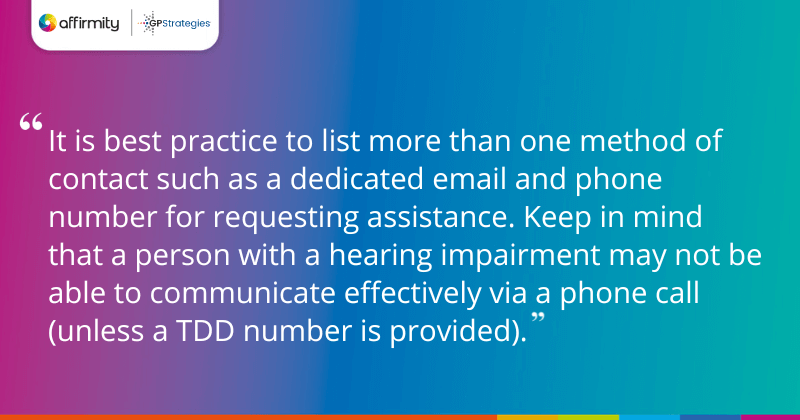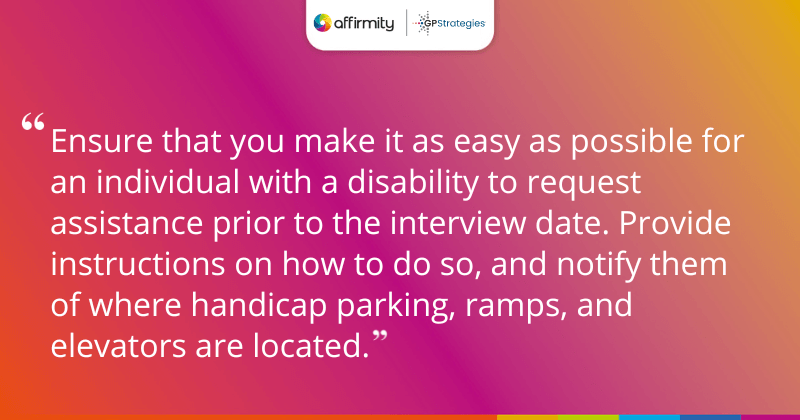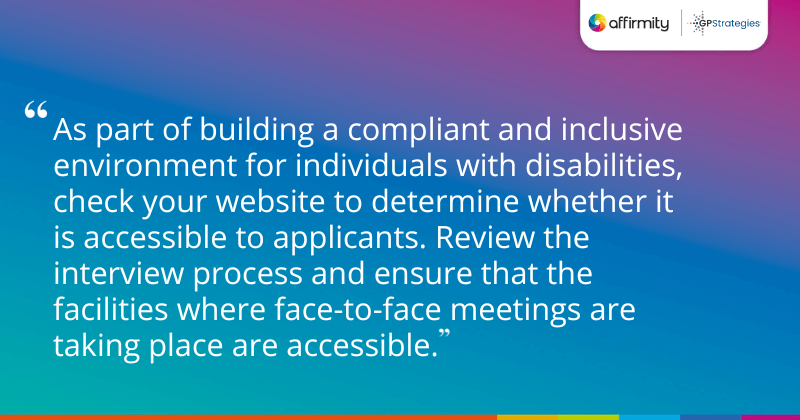Building a workplace that provides reasonable access to applicants and employees with disabilities involves multiple initiatives, some of which go more frequently overlooked than others. Read on to discover four questions that can help you determine whether your organization is making the right decisions and accommodations in this crucial area of diversity and inclusion.
1. Is Your Organization’s Website Accessible?
All federal agencies and institutions that receive federal funding are required to be Section 508-compliant (Rehabilitation Act of 1973) with regards to accessibility of websites for individuals with disabilities. Some states and countries also require websites to be accessible. Many companies are voluntarily choosing to be 508-compliant in order to break down barriers and allow all Internet users the ability to navigate through their websites, as well as to conduct business and apply for jobs online.

Federal contractors and subcontractors required to abide by Section 508 of the Rehabilitation Act have specific obligations related to accommodations. A prominent notice must be placed on the company’s website explaining the process for individuals to request an accommodation in order to apply for a job opening.
It is best practice to list more than one method of contact such as a dedicated email and phone number for requesting assistance. Keep in mind that a person with a hearing impairment may not be able to communicate effectively via a phone call (unless a TDD number is provided).
As a best practice, those receiving calls and/or emails should be properly trained on etiquette for communicating with individuals with disabilities, and the accommodation, no matter its form, should be tracked for purposes of providing information upon request to federal agencies in case of an audit or complaint investigation. Responses to requests for accommodations should also be completed in a timely manner.
It is essential that more than one person is trained to handle these requests to cover leave, periods of high demand or departures from the business. Similarly, we would advise organizations to have a dedicated email for accommodation requests monitored by more than one employee. A useful list of additional section 503-related best practices is available on the OFCCP website.
NEED TO ASK AN EXPERT? | ‘New Voluntary Self-Identification of Disability Form’
2. Is the Place Where You Are Conducting an Interview Accessible?
Not only should the application process be accessible, but an employer should consider whether or not the site where the interview will take place is accessible for individuals with disabilities.

Accessibility enhancements appropriate to your premises may include:
- Ample handicapped parking spaces (at minimum, the number required by law)
- Wheelchair ramps to get into the building
- Wheelchair and scooter-accessible electronic doors, elevators, restrooms and water fountains
- Counter-space in breakrooms and other work areas that are low enough for all person to reach
Ensure that you make it as easy as possible for an individual with a disability to request assistance prior to the interview date. Provide instructions on how to do so, and notify them of where handicap parking, ramps, and elevators are located.
Consider asking whether or not any accommodations are needed as part of the interview process. Accommodations could include having a sign language interpreter on hand, needing additional time to take written tests, or having any forms available in braille or large print.
YOU MAY ALSO LIKE | ‘5 Virtual ERG Lessons Learned From Lockdown’
3. If the Person Is Hired, Is the Onboarding Process Accessible?
It is not unusual for organizations to be so focused on attracting individuals with disabilities to apply for jobs and then ensuring that the hiring process is inclusive for all individuals, that they actually forget to determine whether the new hire’s experience after receiving the acceptance letter is inclusive.
It is important to regularly review the onboarding process to determine if individuals with disabilities can:
- Sign up for benefits
- Voluntarily self-identify their disability status and their need for an accommodation
- Submit emergency contact information
- Access company policies and procedures
These are just some of the common tasks employers ask new hires to complete online after they accept a job offer.
Although many of the accommodations often made by employers with regards to this process revolve around visual impairments, keep in mind that someone with a hearing impairment might also need an accommodation if videos are required to be reviewed as part of the onboarding process or ongoing training for employees is needed. These should be available with closed captioning or with a transcript available.
MORE FROM THE BLOG | ‘Advanced Diversity & Inclusion Planning: Experts Address 11 Key Issues’
4. Are Appropriate Personnel Notified of a Person’s Disability (Where Necessary)?
Under the Americans with Disabilities Act as well as Section 503 of the Rehabilitation Act, an employee’s medical history or condition must be kept confidential. One exception to this rule is that the employee’s supervisor or manager is allowed to be told of the medical condition if the employee will require an accommodation.

It is a best practice for a person’s direct supervisor to be made aware of medical conditions, such as epilepsy, diabetes, or severe allergies. Inform them of how to properly seek medical assistance from trained staff members such as first-aid/medical personnel when necessary. If the company has first-aid personnel, they should also be informed of any medical conditions that could require medical attention in case of an emergency.
As part of building a compliant and inclusive environment for individuals with disabilities, check your website to determine whether it is accessible to applicants. Review the interview process and ensure that the facilities where face-to-face meetings are taking place are accessible.
Consider creating a document to send to applicants ahead of time instructing them of handicap parking spaces and the process to request an accommodation during the interview. Review the onboarding process to ensure that it also is inclusive of all employees. And inform proper staff of any medical conditions that might require special attention in the event of a medical emergency.
Looking for more advice on making accommodations for applicants and employees with disabilities, or individuals from other groups? Contact us today.
This article was originally published in September 2016 and has since been updated in line with the latest best practice information.
